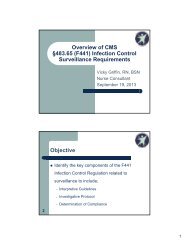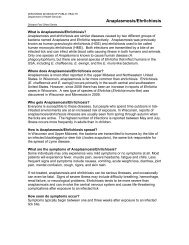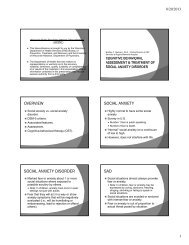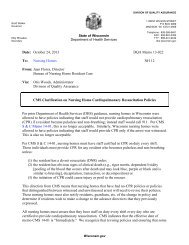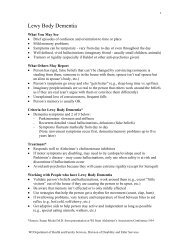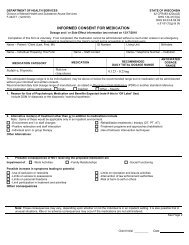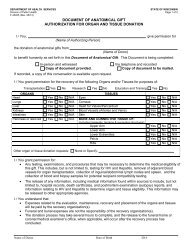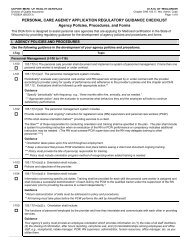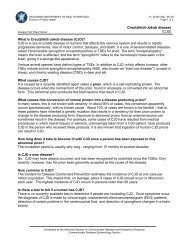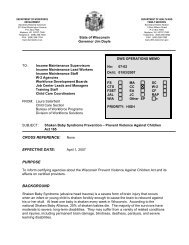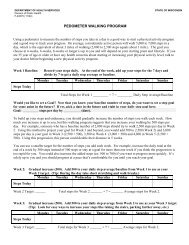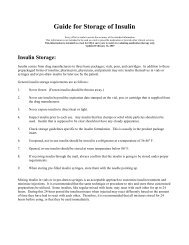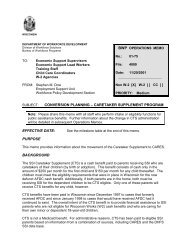Air Issues -- Home Heating Oil Spills Fact Sheet - Wisconsin ...
Air Issues -- Home Heating Oil Spills Fact Sheet - Wisconsin ...
Air Issues -- Home Heating Oil Spills Fact Sheet - Wisconsin ...
Create successful ePaper yourself
Turn your PDF publications into a flip-book with our unique Google optimized e-Paper software.
Indoor <strong>Air</strong> and Vapor <strong>Issues</strong> State of <strong>Wisconsin</strong><br />
Fuel oil is a hazardous substance. Respond immediately to fuel oil spills.<br />
Clean up small drips and spills by following the instructions in this fact sheet.<br />
For spills involving more than one gallon of fuel oil, hire a cleanup company<br />
specializing in hazardous materials and spill response.<br />
How home fuel oil spills occur<br />
There are two types of home fuel oil spills, small and large. Small spills happen when a few<br />
drops of fuel oil drip out of the tank or pipes. Large home fuel oil spills can occur when<br />
basement storage tanks are overfilled, an attempt is made to fill a tank that has been removed,<br />
a tank has overturned in a flooded basement, or fuel oil is accidentally put into a septic tank<br />
vent or well casing. All large spills will require some amount of professional help to clean up.<br />
The basics of cleaning up a basement fuel oil spill<br />
For Any Size Spill:<br />
Always respond immediately to fuel oil spills, no matter how small. The successful clean up<br />
of spilled fuel oil depends on a quick response. Fuel oil that has soaked into concrete floors<br />
and wood support beams, or has had time to flow into cracks or drains and get beneath floors<br />
and walls will be more difficult to clean up. Sometimes demolition and removal is the only<br />
option when walls and floors are saturated with fuel oil. If fuel oil left the house through<br />
cracks in the floors, drain tile systems, sump pumps etc. an environmental investigation may<br />
be needed that includes collecting soil and groundwater samples and cleanup of contaminated<br />
soil and/or groundwater.<br />
It is important to use proper clean up methods.<br />
Prevent an explosion or fire<br />
- Turn off all flame and spark sources. Don't smoke or light matches in the area. Extinguish<br />
pilot lights on furnaces, water heaters, and gas dryers. Turn off gas appliances that have<br />
electronic ignitions. Do not attempt to clean up spilled oil with a shop vac or use any<br />
electric appliances or power tools. Keep all sources of ignition away from the area until<br />
the spill is completely cleaned up.<br />
Open windows to control odors<br />
- Open basement windows to ventilate the area. Close all basement cold air returns and<br />
heat registers, including the basement door. Close other openings that may allow vapors<br />
to enter the upper floors of your home. If your basement has been found not to be in<br />
danger of exploding from the fuel oil vapors, you can also ventilate the area with electric<br />
fans.
For Small <strong>Spills</strong>:<br />
Small spills (anything less than a gallon) can often be cleaned up successfully by the<br />
homeowner. Call a professional cleaning service if you need help with the clean up, or if the<br />
fuel oil odors remain.<br />
Prevent exposure<br />
- When cleaning up a small fuel oil spill, wear rubber gloves and old shoes or boots that can<br />
be thrown away. Ventilate the area as much as possible during the clean up. Wash<br />
exposed skin with soap and warm water.<br />
Clean up the spill<br />
- Spread an absorbent material, like cat litter or sawdust, over the spill. Shovel the absorbed<br />
oil into heavy-duty plastic bags. Keep the bags outside until they can be picked up for<br />
disposal.<br />
- Anything porous that came into contact with the spilled oil should be removed and<br />
properly disposed of if can not be cleaned. Examples are wood and drywall walls,<br />
carpeting and other flooring, clothing, furniture etc.<br />
- Use soap and hot water to clean the floor, walls, appliances and other hard surfaces.<br />
Check under appliances, such as the washer and dryer, to be sure all of the oily residue is<br />
removed. Repeated cleanings may be necessary.<br />
For Large <strong>Spills</strong> (one gallon or more):<br />
Report the spill<br />
- If an oil delivery company was involved, call them immediately to report the spill. If the<br />
oil delivery company caused the spill, they can be asked to take care of the clean up.<br />
- Report the spill to the Department of Natural Resources (DNR) 24-hour hotline,<br />
1-800-943-003.<br />
- Contact your local fire department to determine if there is an explosion hazard. They may<br />
also be able to provide fans to ventilate the area.<br />
- You may also wish to contact your local health department and home insurance agent.<br />
Prevent exposure<br />
- It is best to avoid breathing the fuel oil fumes and minimize skin contact. Fuel oil contains<br />
many substances which vary in their toxicity. Short term exposure may cause headaches,<br />
nausea and dizziness, prolonged exposure can cause serious health problems.<br />
- Consider staying at a motel or with relatives until the clean up is complete. Moving out of<br />
your home for a day or two may be a good idea, especially if there are young children,<br />
elderly, or medically compromised people in the home.<br />
Contact a cleanup company about cleaning up the oil<br />
- Call a professional cleaning service. Your local health department or DNR office may be<br />
able to give you a list of professional cleaning services in your area.
- If fuel oil has escaped the building as noted above, an environmental consultant may be<br />
needed. They may collect soil and groundwater samples to define the extent of<br />
contamination resulting from the fuel oil that left the building, and to determine an<br />
appropriate cleanup strategy.<br />
What to expect after the clean up<br />
The clean up of a fuel oil spill is not complete until odors are gone. If fuel oil spills are<br />
promptly and completely cleaned, residual odors should go away after several days.<br />
Persistent odors indicate a continued source such as saturated cinder blocks, contaminated<br />
soils, wood and drywall, sumps, or floor drains that need additional clean up.<br />
The use of chemical air fresheners is not recommended. These products merely mask the fuel<br />
odor by adding other volatile chemicals to an already complex mixture. Their use may<br />
increase symptoms in sensitive individuals.<br />
Health concerns associated with fuel oil spills<br />
Brief exposure to fuel oil will not usually cause long-term harm. However, breathing fuel oil<br />
vapors in an enclosed space like a basement can cause some short term symptoms. At high<br />
concentrations (like those in large spill situations), symptoms can include nausea, dizziness,<br />
and eye, nose, or throat irritation. Getting fuel oil on the skin can cause skin irritation. Some<br />
individuals may be more sensitive to these effects than others. Even at low concentrations,<br />
the strong odor of fuel oil can still make many people feel ill. Getting to fresh air will usually<br />
relieve these symptoms.<br />
Very long-term exposure to fuel oil odors in the home (exposure for many years) has the<br />
potential for more serious health problems. These include liver and kidney damage,<br />
increased blood pressure, other blood problems, and cancer. A simple “rule of thumb” is if<br />
you can smell fuel oil, there is an exposure risk.<br />
See a doctor if you have symptoms that don't improve when you are away from the fuel oil<br />
vapors.<br />
Who to call for help?<br />
• Call your oil delivery company. They may be able to help with the clean up.<br />
• The DNR 24-hour hotline for reporting spills is 1-800-943-0003.<br />
• Call your local fire department if you feel there is a fire or explosion hazard.<br />
• Call your local health department or family physician for health related questions.<br />
• Call your homeowner's insurance representative. Your policy may provide financial<br />
assistance for clean up or temporary housing expenses.<br />
• Visit the department's website, http://dhs.wisconsin.gov/eh/<br />
Developed by the <strong>Wisconsin</strong> Division of Public Health<br />
Bureau of Environmental and Occupational Health<br />
1 West Wilson, Madison WI 53701<br />
PPH 7150 (revised 08/08)



